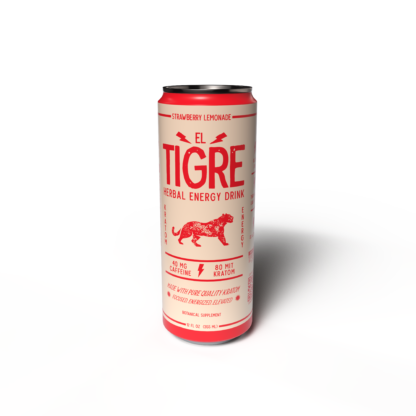Kratom’s Effects on Energy Levels
Kratom, an herbal supplement derived from the Mitragyna speciosa tree, has gained popularity for its potential effects on energy levels.
Stimulant Properties
Kratom contains alkaloids that interact with opioid receptors in the brain, producing a range of effects, including stimulation and increased energy.
While kratom is often marketed as an alternative to coffee or other energy drinks, it’s important to understand its potential benefits and risks.
- In lower doses, kratom can promote feelings of alertness and focus, similar to the effects of caffeine.
- At higher doses, kratom may induce euphoria and relaxation, leading some users to describe it as a “mild opioid.”
- It’s crucial to note that kratom can have adverse effects, including nausea, vomiting, constipation, and withdrawal symptoms upon cessation.
Energy Boost Mechanisms
Kratom’s energy-boosting properties stem from its interaction with opioid receptors in the brain. These alkaloids mimic the effects of opioids, leading to stimulation and heightened energy levels.
- Kratom activates dopamine pathways in the brain, contributing to feelings of euphoria and motivation.
- It also influences norepinephrine, a neurotransmitter involved in alertness and focus.
- By modulating these neurotransmitters, kratom can induce a state of heightened energy and cognitive function.
Safety and Risks Associated with Kratom Energy Drinks
The increasing popularity of energy drinks has led to novel ingredients finding their way into these beverages. One such ingredient is kratom, an herbal supplement derived from the Mitragyna speciosa tree. While kratom is often promoted for its potential to boost energy levels and cognitive function, it’s essential to understand the associated risks before incorporating it into your diet.
Potential Side Effects
Combining kratom with high amounts of caffeine in energy drinks can amplify both the beneficial and detrimental effects. This combination may lead to heightened energy levels, but it also increases the risk of experiencing adverse side effects such as anxiety, insomnia, tremors, and digestive issues.
Additionally, individuals with pre-existing health conditions, particularly those related to heart or blood pressure regulation, should exercise extreme caution when consuming kratom-containing energy drinks.

Long-term use of kratom, even in energy drinks, can potentially lead to dependence and withdrawal symptoms. These symptoms may include fatigue, muscle aches, irritability, and sleep disturbances.
Drug Interactions
Kratom’s interaction with opioid receptors in the brain can create a range of effects, some potentially dangerous when combined with other substances or existing medical conditions. Drug interactions involving kratom can be complex and unpredictable.
Individuals taking medications that affect serotonin levels, such as selective serotonin reuptake inhibitors (SSRIs) or tricyclic antidepressants, should avoid kratom due to the risk of serotonin syndrome, a potentially life-threatening condition.
Kratom may also interact with central nervous system depressants like benzodiazepines, leading to increased drowsiness and respiratory depression. This combination can be highly dangerous.
Individuals with liver or kidney issues should exercise extreme caution as kratom is metabolized by these organs.
It’s crucial for anyone considering using kratom-containing energy drinks to consult their doctor, especially if they have any pre-existing health conditions or are taking medications.
Overdose Risk
Kratom energy drinks pose several safety risks due to the potential for overdose and interactions with other substances. Kratom’s alkaloids can affect opioid receptors in the brain, leading to a range of effects from stimulation to euphoria.
Consuming large quantities of kratom or combining it with stimulants like caffeine can significantly increase the risk of overdose. Symptoms of kratom overdose may include nausea, vomiting, seizures, respiratory depression, and coma.
The risks associated with kratom energy drinks are amplified by the often unregulated nature of these products. Dosage amounts may be inconsistent, making it difficult to control intake and avoid potential overconsumption.
Legality of Kratom Energy Drinks
The legality of kratom energy drinks varies widely depending on location. Some countries and states have banned kratom entirely, while others have regulated its sale and use. In the United States, kratom is legal at the federal level but remains prohibited in certain states. Consumers should be aware of their local laws and regulations regarding kratom products before purchasing or consuming them.
Varying Regulations by Location
The legality of kratom energy drinks varies significantly across different regions.

- Some countries have outright banned kratom, deeming it too dangerous for public consumption.
- Other countries allow kratom sales but impose strict regulations on its production, distribution, and labeling.
- In the United States, kratom’s legal status is complex, with federal legality coexisting alongside state-specific bans or restrictions.
It is essential for consumers to research the specific laws governing kratom in their location to ensure they are complying with local regulations.
Federal Legal Status in the U.S.
At the federal level in the United States, kratom is not illegal. However, several states have enacted bans or restrictions on kratom products.
These variations in state laws highlight the ongoing debate surrounding the safety and regulation of kratom.
Consumers in the U.S. should carefully check their state’s regulations regarding kratom to ensure they are acting within legal boundaries.
Consumer Considerations When Choosing Kratom Energy Drinks
Choosing kratom-infused energy drinks requires careful consideration due to the potential risks and benefits associated with this herbal supplement.
Quality and Sourcing of Kratom
When considering kratom energy drinks, consumers should prioritize quality and sourcing. Look for products from reputable manufacturers who transparently disclose their ingredients and sourcing practices. Opting for organically grown kratom minimizes exposure to potential pesticides or contaminants.
Third-party lab testing is crucial to ensure the purity and potency of kratom extracts used in energy drinks. Reputable brands will provide certificates of analysis (COAs) verifying the absence of harmful substances and confirming the accurate dosage of alkaloids present.
Be wary of products with vague ingredient lists or those that make unsubstantiated claims about their effects.
Understanding the origin of kratom is essential. Products sourced from sustainably managed farms are more likely to ensure ethical practices and environmental responsibility.
Dosage and Concentration
Consumers should carefully evaluate the dosage and concentration of kratom in energy drinks. Kratom’s effects can vary significantly depending on the amount consumed. It’s important to start with a low dose and gradually increase it as needed, while paying close attention to how your body responds.
The concentration of kratom alkaloids in energy drinks can also vary widely.
Look for products that clearly state the dosage per serving, allowing you to make informed choices based on your individual tolerance and desired effects.
It’s crucial to be mindful of potential drug interactions when consuming kratom-containing energy drinks. Kratom can interact with various medications, including those affecting serotonin levels, blood pressure regulation, and central nervous system function.
Consulting your healthcare provider before using kratom, especially if you are taking any medications, is essential to minimize the risk of adverse reactions.
Other Ingredients and Additives
Choosing kratom-infused energy drinks requires careful consideration due to the potential risks and benefits associated with this herbal supplement. Consumers should prioritize quality and sourcing. Look for products from reputable manufacturers who transparently disclose their ingredients and sourcing practices. Opting for organically grown kratom minimizes exposure to potential pesticides or contaminants.
Third-party lab testing is crucial to ensure the purity and potency of kratom extracts used in energy drinks. Reputable brands will provide certificates of analysis (COAs) verifying the absence of harmful substances and confirming the accurate dosage of alkaloids present. Be wary of products with vague ingredient lists or those that make unsubstantiated claims about their effects.
Understanding the origin of kratom is essential. Products sourced from sustainably managed farms are more likely to ensure ethical practices and environmental responsibility.
Consumers should carefully evaluate the dosage and concentration of kratom in energy drinks. Kratom’s effects can vary significantly depending on the amount consumed. It’s important to start with a low dose and gradually increase it as needed, while paying close attention to how your body responds.
The concentration of kratom alkaloids in energy drinks can also vary widely. Look for products that clearly state the dosage per serving, allowing you to make informed choices based on your individual tolerance and desired effects.
It’s crucial to be mindful of potential drug interactions when consuming kratom-containing energy drinks. Kratom can interact with various medications, including those affecting serotonin levels, blood pressure regulation, and central nervous system function.
Consulting your healthcare provider before using kratom, especially if you are taking any medications, is essential to minimize the risk of adverse reactions.

Alternatives to Kratom-Based Energy Drinks
For individuals seeking alternatives to kratom-based energy drinks, a variety of options exist.
Consider naturally energizing beverages like green tea or yerba mate, which contain caffeine and antioxidants.
Other alternatives include coffee, guayusa tea, or matcha, each offering unique flavors and levels of caffeine.
Additionally, incorporating healthy lifestyle practices such as regular exercise, sufficient sleep, and a balanced diet can contribute to sustained energy levels without relying on kratom-containing products.
Caffeine-Based Energy Drinks
Caffeine-based energy drinks offer an alternative to kratom-infused options. These beverages typically contain high amounts of caffeine, providing a quick boost in alertness and energy. Popular choices include Red Bull, Monster Energy, and Rockstar.
However, excessive caffeine consumption can lead to adverse effects such as anxiety, insomnia, headaches, and digestive issues. It’s important to consume caffeine in moderation and be aware of your individual tolerance levels.
For those seeking natural alternatives, consider options like green tea, yerba mate, or guayusa tea. These beverages contain lower amounts of caffeine than traditional energy drinks and also provide beneficial antioxidants. They offer a gentler and more sustainable energy boost compared to kratom-based or high-caffeine options.
Additionally, focusing on a healthy lifestyle with regular exercise, adequate sleep, and a balanced diet can contribute to sustained energy levels throughout the day.
Natural Energy Boosters (e.g., exercise, healthy diet)
For individuals seeking alternatives to kratom-based energy drinks, a variety of options exist.
- Consider naturally energizing beverages like green tea or yerba mate, which contain caffeine and antioxidants.
- Other alternatives include coffee, guayusa tea, or matcha, each offering unique flavors and levels of caffeine.
- Additionally, incorporating healthy lifestyle practices such as regular exercise, sufficient sleep, and a balanced diet can contribute to sustained energy levels without relying on kratom-containing products.
Sip and soar with Kratom
Melissa J Design
Rabbit Hole London
- How To Make The Most Of Your Skincare Consultation For Long-lasting Results - September 16, 2025
- Bum Filler Injections In Camberley Surrey - September 16, 2025
- Bret Easton Ellis Quotes - September 15, 2025



